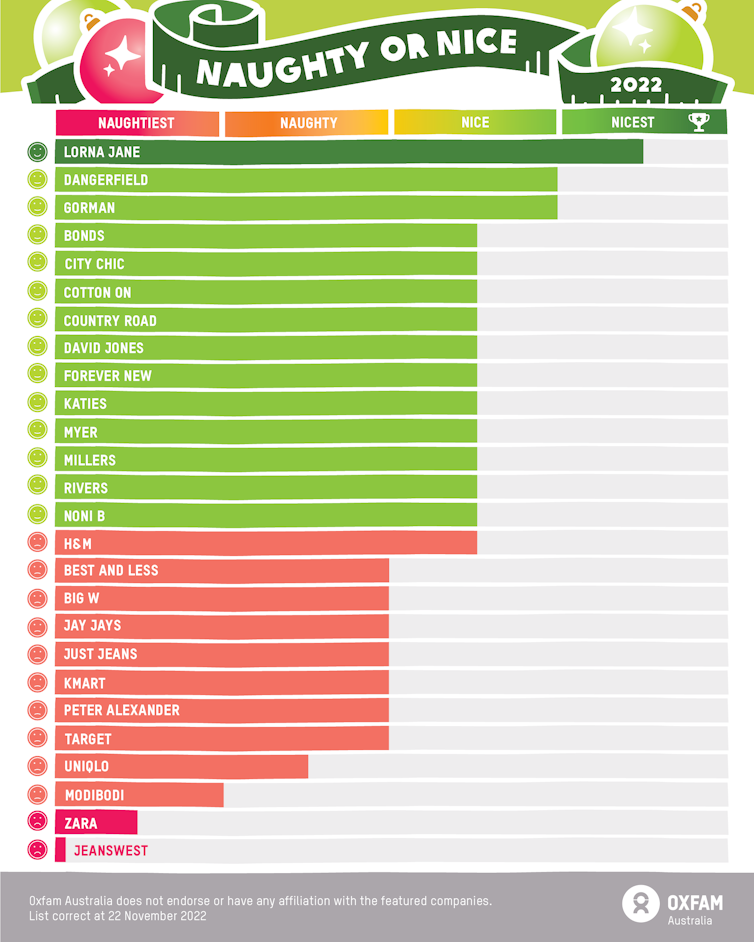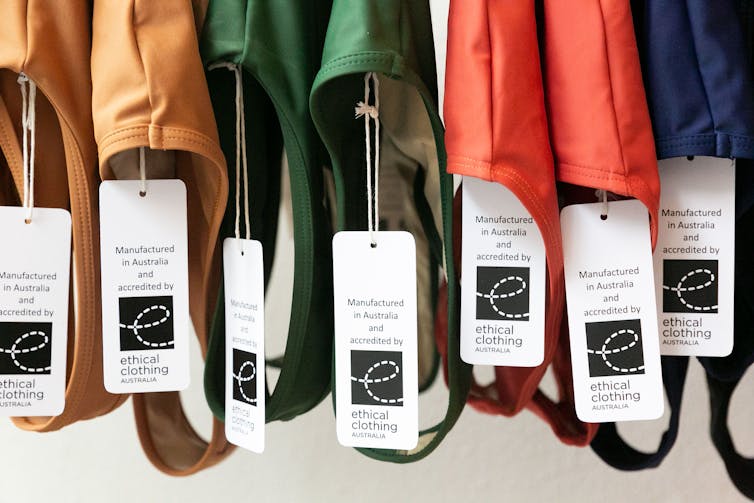You face a dilemma. You’ve found the perfect shirt, and it’s an absolute bargain, but you notice it’s “Made in Bangladesh”. You’re conscious it was probably made using cheap labour. You have to decide whether you want it or not.
Oxfam has released their annual Naughty List. This listing highlights retailers that have committed to transparency and responsible sourcing.

Oxfam, Original author
This is just one resource that aims to promote ethical consumption. Yet despite concerns of sweatshop labour, and consumers claiming they’re willing to pay more for ethically-sourced clothes, there remains high demand for ultra-low-price mass-produced clothing.
Motivated reasoning is a psychological phenomenon that explains this. Motivated reasoning is a psychological phenomenon that explains how individuals convince themselves that working in sweatshops is okay as long as they are able to get a good product.
Continue reading:
To meet their sustainability objectives, brands are turning to’recycled clothes’ for clothing. They are made in what way? How are they made?
Low-priced clothing is expensive
Consumption is an individualistic act. Consumption allows us to be unique through what we wear, our culture and the entertainment that we consume. When consumers think about the larger environmental and social impacts of their consumption, ethical consumption includes clothing purchases.
Global apparel sales are expected to grow by US$2 Trillion (roughly A$3 Trillion) in 2026. Asia continues to be the global garment manufacturer. This country is responsible for about 55% of the world’s textiles and apparel exports. There are approximately 60 million employees.
And the International Labour Organisation has estimated 160 million children aged 5 to 17 were engaged in child labour at the beginning of 2020 – many of whom would have worked in the fashion supply chain.
Isn’t any job better than no job?
Employers who use exploitative labour arrangements have a common defense: it’s often the best work option. The conditions are accepted by workers, which helps in the long-term development of an economy.
However, new research shows that sweatshops can be attributed to consumer choice. This means retailers simply respond to the demand for low-priced clothing. This suggests that sweatshops would not exist if there were no demand.
But one problem with holding consumers responsible is that the vast majority aren’t aware of how their clothes are made. Despite “supply chain transparency” being credited for increasing brand legitimacy and trust, true transparency is difficult to attain, even for retailers, due to the disjointed and distant elements of how products move through the supply chain (which includes suppliers, producers, manufacturers, distributors and retailers).
Our own research into consumers’ perception of worker welfare found people struggle to connect the $5 shirt they bought with the person who made it, or how it was made.
Continue reading:
We asked fast-fashion shoppers about their ethical choices and found that they could only accomplish so much.
Motivated reasoning
Oxfam’s Naughty or Nice list aims to name (and essentially shame) retail brands that fail to disclose which factories they source product from, and how they manage sourcing integrity. The logic is that if consumers are aware of which brands disclose their ethical sourcing strategies, then they’ll make more informed purchase decisions.
Unfortunately, it’s not that simple. As long as our brains maintain an illusion that objectivity, we can come to the conclusions we want. We believe even when there is evidence to the contrary.
A person can consider themselves an ethical consumer (which forms part of their “self-concept”) and still buy a $5 shirt, though they suspect it may have been made in a sweatshop. They may tell themselves “any job is better than no job” for workers, or “money saved today is money to spend on the children tomorrow”. They believe they are objectively considering the purchase.
The theory of self-concept explains how consumers can justify the “ethical burden” away. The theory of self-concept also suggests higher-order thinking is used by people to justify and justify their personal actions.
Most of us are so distant from supply chain exploitation, and so hooked on scoring a bargain, that seeing a list of “naughty” retail brands won’t change our behaviour.
Motivated reasoning is evidence
Scientists have examined how motivated reasoning can lead to more favorable outcomes for self-concept protection.
In one experiment they examined whether participants would use economic justifications (such as “any job is better than no job”) to book a Caribbean holiday at a resort associated with questionable labour practices. Participants were more likely to justify their decision and book the vacation despite allegations of exploitative working conditions.
They also examined the relationship between sweatshop labor and consumer desire. Economic justifications for sweatshop-made high-quality shoes are higher than expected. Another study found that motivation was used, among others, to justify self-allocation of annual bonuses and keeping overpayments.
What can you do to shop ethically?
Bottom line, ethical consumption should be internal motivated. You have many options to support you once this motivation is established.
The power of knowledge is in the mind
Oxfam’s Naughty or Nice report, Clean Clothes’ Brand Tracker, Fair Wear, Good On You, and Fashion Revolution’s Fashion Transparency Index are all great resources to identify which brands disclose their social policies, practices, and impacts in their operations and supply chain.
Accreditation of brands
Many brands will tell you if their ethical credentials have been certified by organizations such as Ethical Clothing Australasia, WRAP and Fairtrade International. This accreditation usually involves rigorous independent eligibility tests and compliance with all guidelines.

Ethical Clothing Australia
Self-reporting
Online policies of many leading brands on ethical sourcing or slave labor are available (see Kmart, Target, Wesfarmers). Make sure the claims are made in accordance with reporting requirements from Australia’s Modern Slavery Act 2018.
Continue reading:
Slavery in modern times: How consumers can make an impact